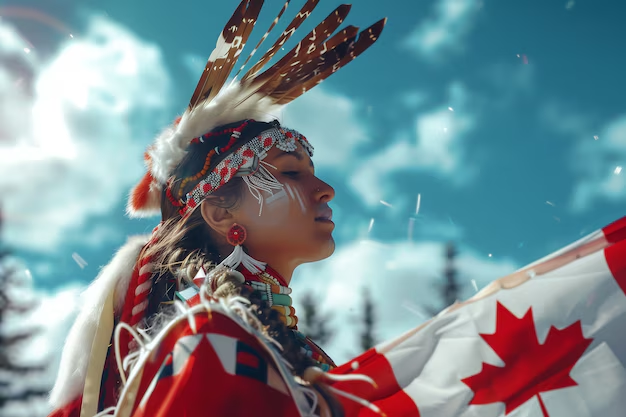Canada, a country celebrated for its breathtaking landscapes, multicultural society, and strong sense of community, boasts a rich tapestry of traditions and cultural values. This article delves into the heart of Canada culture and traditions, exploring the ways in which its diverse population and history have shaped this remarkable country.
A Mosaic of Cultures: Embracing Diversity
Canada culture and traditions identity is deeply rooted in its diversity. The term “cultural mosaic” is often used to describe the country’s approach to multiculturalism, where various ethnicities and cultures coexist and thrive together, maintaining their unique identities while contributing to the broader Canadian experience. This approach contrasts with the “melting pot” concept in other countries, highlighting Canada’s commitment to inclusivity and diversity.
This multicultural richness is similar to [Arabic culture and traditions], where diverse cultural influences have shaped its society over centuries. Both Canada and Arabic cultures emphasize the value of community, heritage, and the coexistence of multiple traditions within a shared space.
Multicultural Celebrations
In cities like Toronto, Vancouver, and Montreal, cultural festivals are commonplace, celebrating everything from Caribbean rhythms at Caribana to the lively colors of Chinese New Year. These celebrations not only bring people together but also foster an environment of learning and acceptance. Power words like vibrant, unity, and celebration evoke the excitement and joy that characterize Canadian multicultural events.
Canada Culture and Traditions that Reflect Unity and Heritage
From coast to coast, Canadians partake in traditions that reflect their history, pride, and deep connection to their land. Whether it’s national holidays or everyday customs, these traditions reveal the values of kindness, respect, and community that Canadians hold dear.
Canada Day: A Celebration of Unity
One of the most cherished Canada culture and traditions is Canada Day, celebrated on July 1st each year. This national holiday marks the anniversary of the confederation in 1867, bringing Canadians together in a celebration of their shared history. It’s a day filled with fireworks, concerts, parades, and a general spirit of national pride. This holiday is a vivid expression of Canada’s unity, emphasizing the country’s core values of freedom and equality.
Thanksgiving: Gratitude and Togetherness
While Thanksgiving is celebrated in both Canada and the United States, the Canadian version is unique. Observed on the second Monday of October, Canadian Thanksgiving focuses on expressing gratitude for the harvest and the blessings of the past year. Families gather around the dinner table to enjoy traditional dishes such as roast turkey, stuffing, and pumpkin pie, echoing the country’s agricultural roots.
Indigenous Traditions: Honoring the First Nations
Before European settlers arrived, Canada was home to many Indigenous peoples, each with their own rich traditions. Today, the First Nations, Métis, and Inuit communities play an essential role in preserving Canada culture and traditions heritage.
Powwows: Celebrating Indigenous Culture
Powwows are social gatherings that celebrate Indigenous culture through dance, music, and storytelling. These events offer an opportunity for Indigenous peoples to pass down traditions to younger generations, while non-Indigenous Canadians are welcomed to experience and learn about this significant part of the nation’s heritage. Powwows evoke a sense of respect and honor, emphasizing the cultural resilience of Indigenous communities.
Canadian Values Reflected in Daily Traditions
While large cultural celebrations are a hallmark of Canadian society, everyday traditions also reveal much about the country’s values. Courtesy, kindness, and an emphasis on community are woven into the fabric of daily life in Canada.
The Love of Hockey: A National Passion
If there’s one thing that unites Canadians across provinces, it’s their love for hockey. Known as Canada’s national winter sport, hockey is more than just a game—it’s a passion that binds people together. From local ice rinks to professional arenas, hockey represents teamwork, perseverance, and a deep-rooted sense of community. Watching or playing a game is as Canadian as it gets, and this tradition is passed down from generation to generation with great enthusiasm.
Saying “Sorry”: The Politeness Factor
Canada is often associated with politeness, and one of the most endearing traditions is Canadians’ frequent use of the word “sorry.” This habit speaks to the country’s cultural emphasis on respect and courtesy. Whether it’s apologizing for a minor inconvenience or diffusing tension in social interactions, the tradition of saying “sorry” reflects Canadians’ commitment to maintaining harmony in their everyday lives.
The French-Canadian Influence
The French-speaking province of Quebec adds a unique flavor to Canada’s cultural landscape. The province’s history, language, and traditions are distinct, yet they coexist harmoniously with the rest of Canada’s English-speaking population.
Winter Carnival: A Joyous Celebration of the Cold
One of the most famous traditions in Quebec is the Quebec Winter Carnival. Held annually in February, this festival embraces the harsh winter conditions with snow sculptures, ice canoe races, and outdoor festivities. The carnival is a perfect example of how Canadians transform even the coldest days into moments of joy, emphasizing resilience and community spirit.
FAQs About Canadian Culture and Traditions
Q1: What are some unique Canada culture and traditions?
Canada boasts a variety of unique traditions, including Canada Day, Thanksgiving, and powwows. Hockey is also a national obsession, and Canadians are known for their politeness, often saying “sorry” as a common courtesy.
Q2: How does Canada celebrate its multiculturalism?
Canada celebrates its multiculturalism through various cultural festivals, such as Caribana, Chinese New Year, and Indigenous powwows. These events highlight the country’s diversity and commitment to inclusivity.
Q3: What is Canada’s most popular sport?
Hockey is Canada’s most popular sport, with a strong following across all provinces. It is deeply embedded in Canadian culture and is considered a national pastime.
Q4: How is Canadian Thanksgiving different from American Thanksgiving?
Canadian Thanksgiving is celebrated on the second Monday of October and focuses on giving thanks for the harvest and blessings of the past year. It predates the American Thanksgiving and has different origins, with less emphasis on pilgrim stories.
Q5: What role do Indigenous traditions play in Canadian culture?
Indigenous traditions, such as powwows, are integral to Canada’s cultural fabric. These traditions help preserve the heritage of First Nations, Métis, and Inuit peoples and contribute to the country’s multicultural identity.
Conclusion:
Canada’s culture and traditions are a beautiful reflection of its values—diversity, respect, kindness, and unity. Whether through national celebrations, Indigenous ceremonies, or daily acts of politeness, Canadian culture is both vibrant and inclusive. With a strong sense of identity, Canadians continue to honor their past while embracing the future, making Canada a country that welcomes all with open arms.

